Dec 27, 2024 – Day 4 of Bhutan Survey_Visiting Subrang, Gomphu, and Pongchula
Hello, today is the 4th day of Sunim’s Bhutan survey. Today he plan to visit Subrang and Gomphu chiwogs in Trong gewog, then move to Phankhar gewog to survey Pongchula-Tradejon chiwog.
The survey was scheduled to start at 7 AM. Sunim finished his morning prayer and meditation, packed his belongings, and prepared for the survey. The sound of staff members busily moving luggage to load into the car could be heard. Sunim also loaded his packed luggage into the car and headed to the dining hall for breakfast.
The rice prepared by the lodging was too hard and a bit difficult for Sunim to eat, but he went around to each person who had prepared the meal to express his gratitude.
“Thank you for preparing the meal so early. I enjoyed it.”
As soon as Sunim got into the car, the survey vehicle departed. After about an hour’s drive from Tsamang, we arrived at Subrang chiwog in Trong gewog. The villagers of Subrang were waiting for Sunim in front of the temple.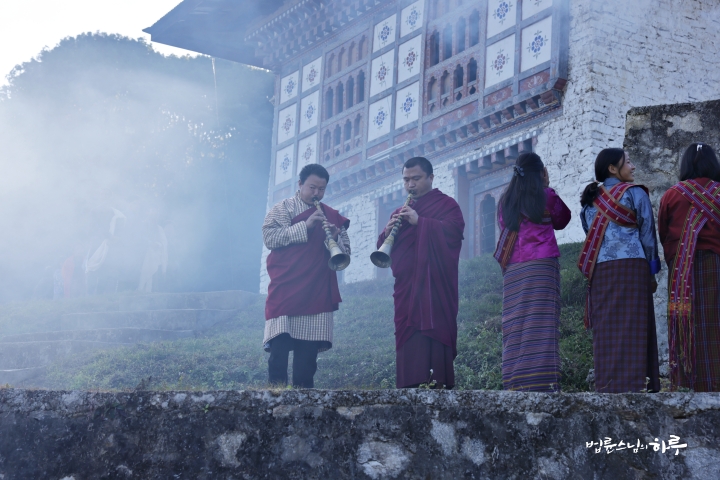
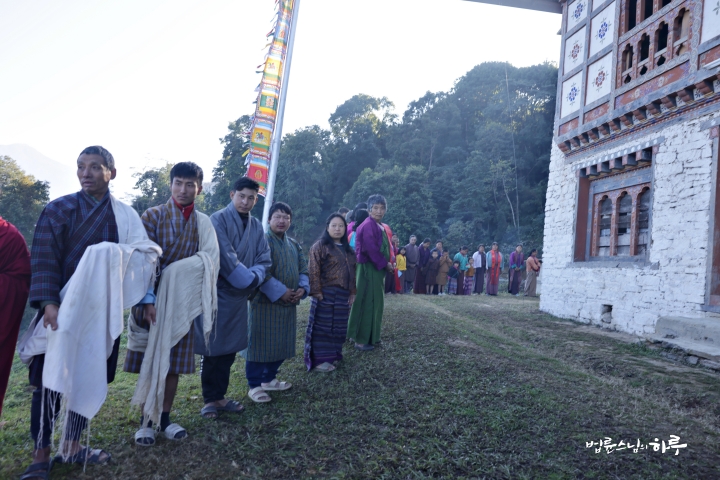
After greeting the Tshogpa, Sunim moved into the temple while placing his hand on each person’s head to give blessings.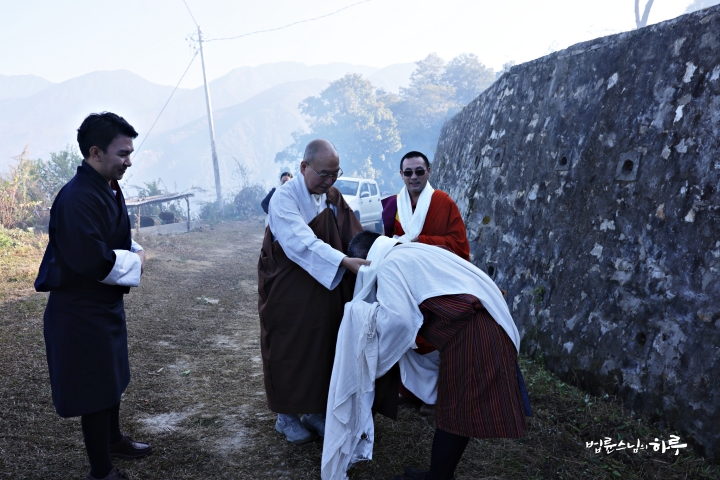
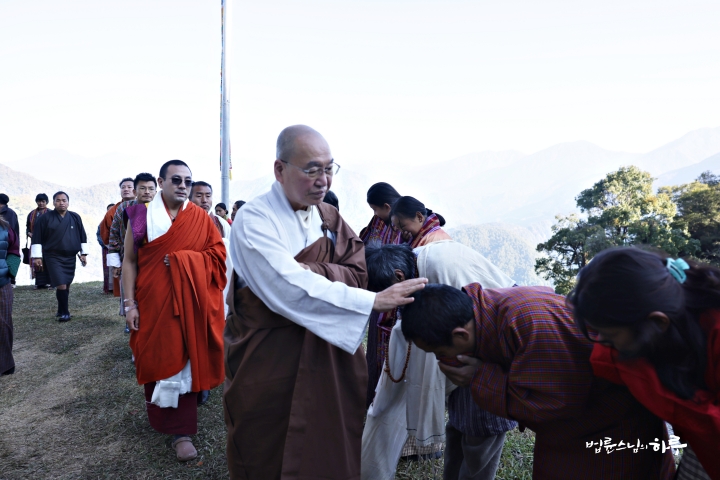
After paying respects in the Bhutanese style at Subrang temple and taking a seat, the villagers also entered the temple.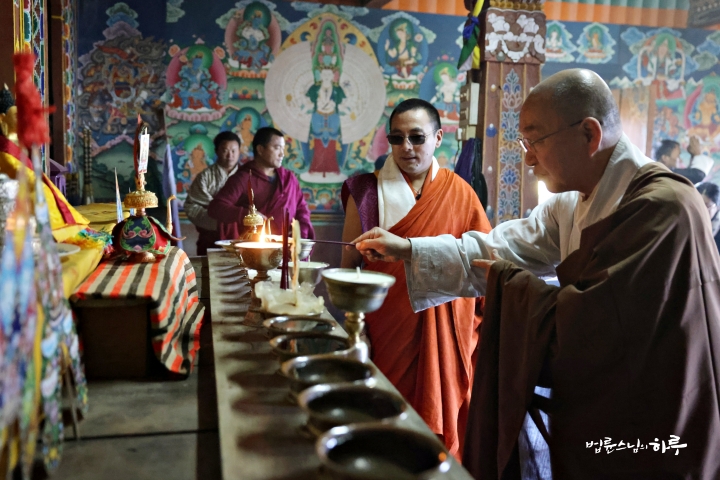
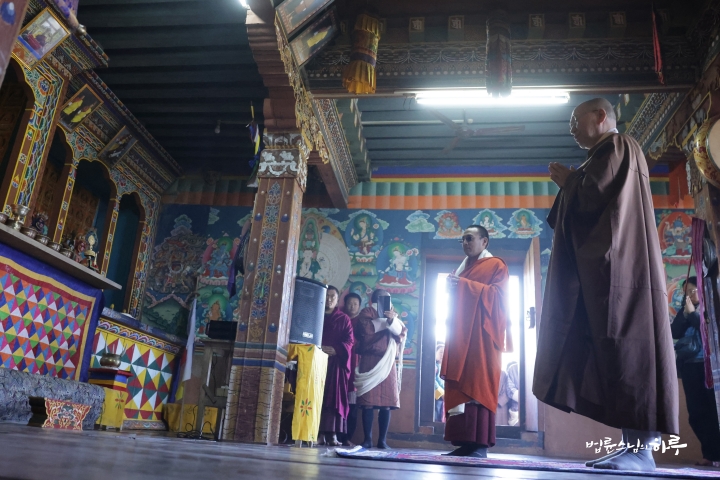
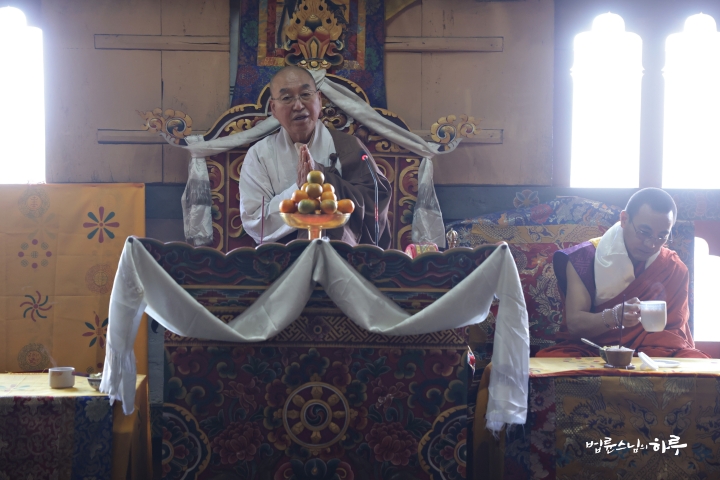
The villagers who entered the temple each offered three bows to Sunim and took their seats in the main hall.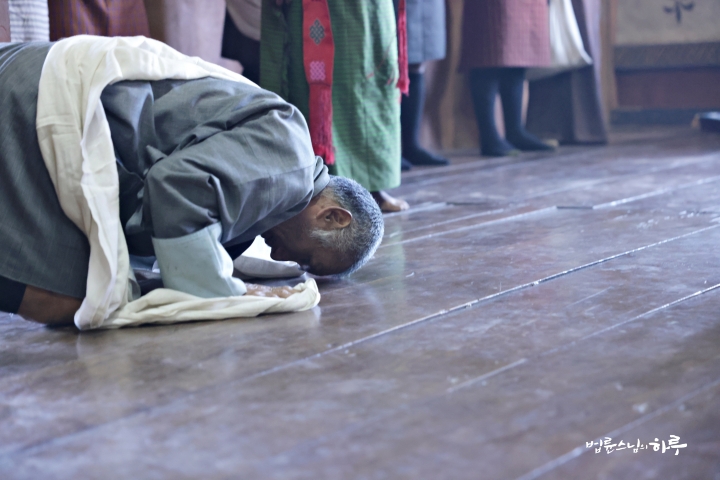
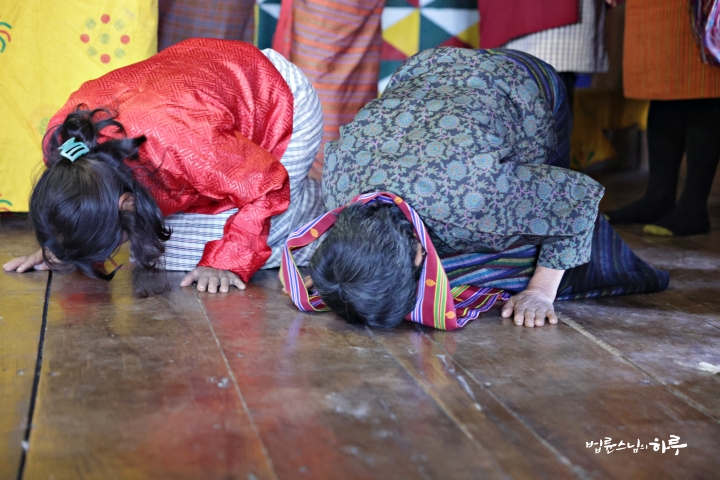
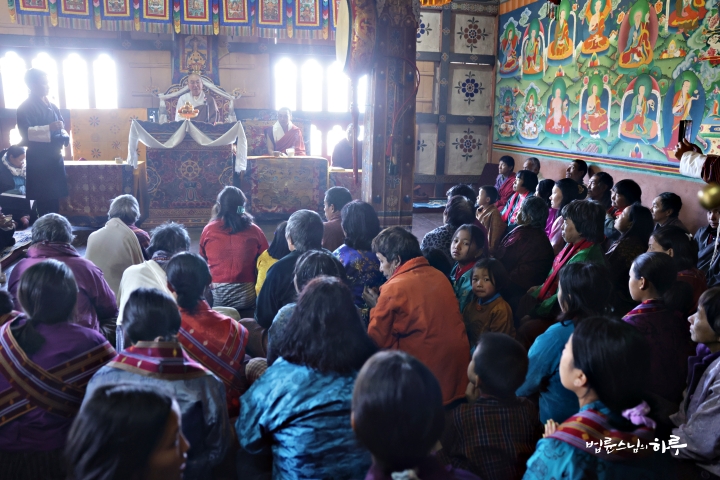
We Can Live Comfortably Without Being Rich, and Happily Despite Being Poor
“First, I take refuge in the Three Jewels – the Buddha, the Dharma, and the Sangha. By the grace of the Buddha and Bodhisattvas, and the kindness of the King of Bhutan, I have been able to meet all of you here in Subrang chiwog.
I visited Bhutan last year at the invitation of the King. Bhutan may not be materially affluent, but it is a country with beautiful natural environment and well-preserved traditions. If we develop Bhutan entirely for the sake of prosperity, the nature will be destroyed. However, if we only focus on preservation, we cannot escape poverty and will fall behind in the world, causing problems like all the young people leaving for foreign countries.
The King has also been deeply concerned about this issue. He decided to develop Gelephu as a new city that keeps pace with global development, while preserving traditional culture and nature in the rest of the country. He has a grand vision to combine these two aspects – preserving traditional culture and developing the regions – in 20 years.
I have come here to participate in this effort, to help the underprivileged people in Bhutan, and to cooperate in the path of sustainable development and preservation of traditional culture. 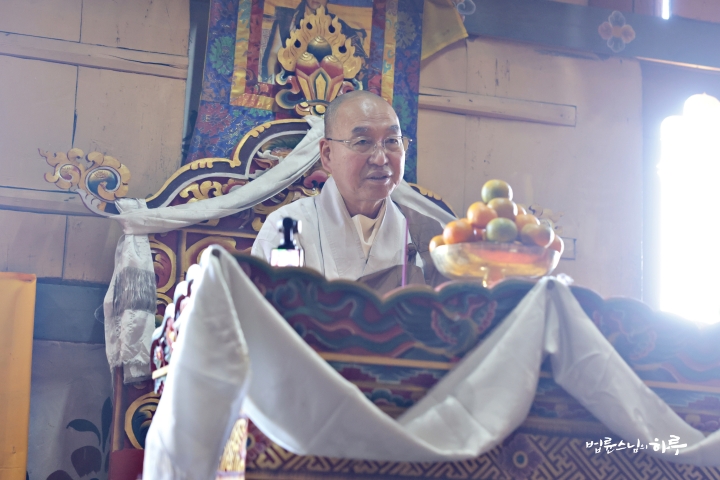
For people to live, first, the air and water must be clean. There must be food and clothes to wear. To live, there must be a house. Children should be able to study at the right time, and when sick, they should receive treatment. For living, at least these aspects should be in place.
From what I see, Bhutan, while not abundant, has these minimum conditions well established.
In the past, everyone had to walk long distances, but now roads have been built for cars to travel. Electricity has reached rural areas, and mobile phones work. However, there are still people in difficulty. One or two houses in a village may not have a home or lack proper facilities inside. Some homes have kitchen fires directly inside the room, causing walls to be blackened by smoke and creating an environment harmful to health. Improving these uncomfortable conditions would make life happier.
The elderly sometimes struggle with cataracts or hearing difficulties. Cataracts can be improved with simple surgery, and hearing loss can be aided with hearing aids.
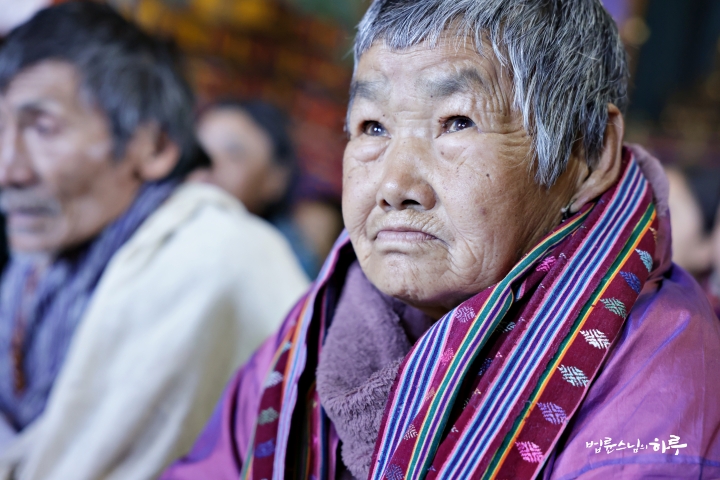
When cultivating fields, fences must be built around them to protect against wildlife damage. For rice farming, irrigation channels need to be created.
Unpaved roads can be made more convenient by paving certain sections well. In areas with water shortages, reinforcing water sources can solve water problems.
By improving the inconvenient aspects of our living environment, we can live more comfortably and happily than we do now.
We may not be rich, but we can live comfortably; we may be poor, but we can be happy.
However, the Bhutanese government cannot support all of these improvements. For matters related to personal life or our villages, it is necessary for individuals or villagers to take initiative and work together to make improvements.
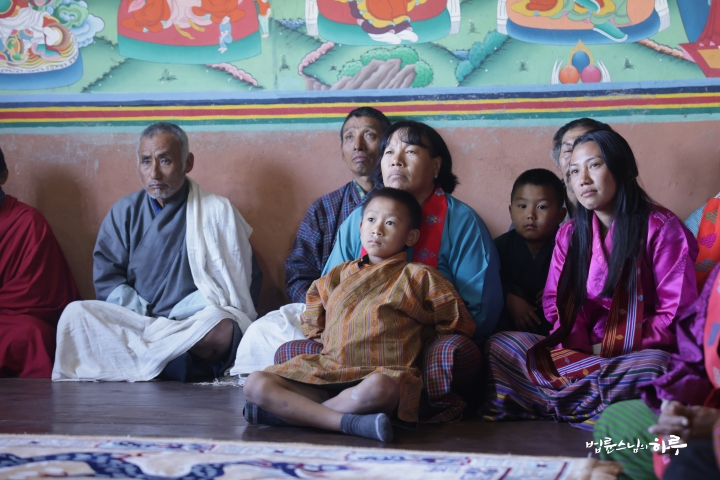
However, improving our environment is not easy because it requires money for materials. Therefore, we plan to provide various materials to support you when you want to improve your living environment. In this way, we aim to work together to improve your living conditions.
This is not a government project, so it is not a program that is provided to you. It’s a project that supports you when you want to make improvements yourselves. The goal is to make our lives a little more convenient this way.
When life is too inconvenient, young people tend to move to more convenient cities. Improving our living conditions and village environment to make them more convenient is a way to encourage young people to settle in the village. This is how we can make our village sustainable. 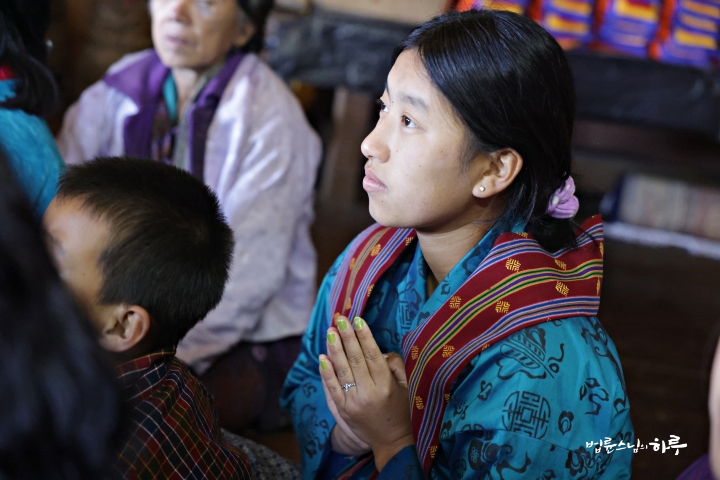
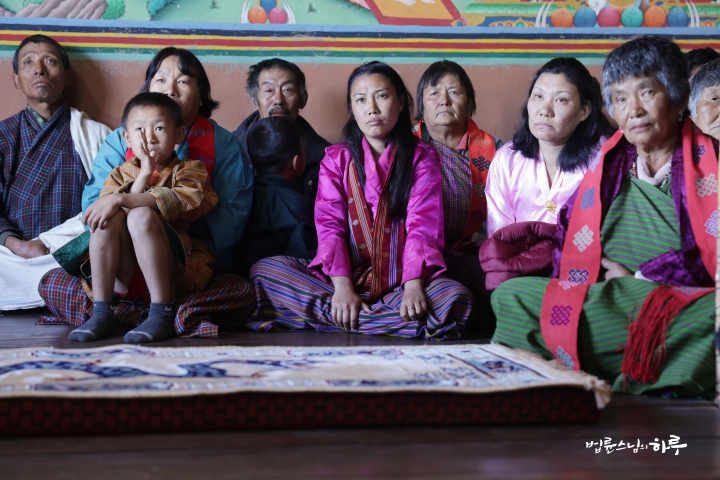
If they have to cook by burning fires indoors with smoke and sit crouched to cook, young women will not want to marry into this village. That’s why kitchen facilities need to be improved. (everyone laughs)
I came to visit because if you have the will, I want to work together. However, if everything I mentioned is already in place, then there’s nothing for me to do. If you say, ‘I don’t want to do it, I wish someone else would do it,’ then you can wait until the government does it. But if you say, ‘We will take care of our village affairs,’ then I will provide all the necessary materials.
If you want to work together on this, the Tshogpa and villagers should discuss what the village needs and plan how to improve it, then submit it to Dzongkhag. If approved, there will be a site visit before proceeding.
Do you understand what I’ve said?
If there’s anything you don’t understand in what I’ve said or if you have any questions, please speak up. 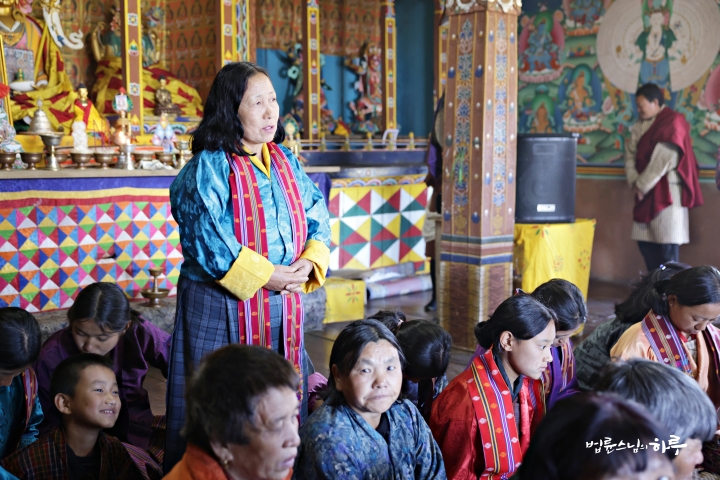
“People might have many other requests because they’re poor, but what our village needs most right now is to supplement the temple facilities.
Two or three times a month, all the villagers gather together, and each time we meet at the temple to discuss and work. Shuprang is a small village. With a small population, it’s not easy to hold village community events. We want to supplement the temple facilities so that we can conveniently hold village events.”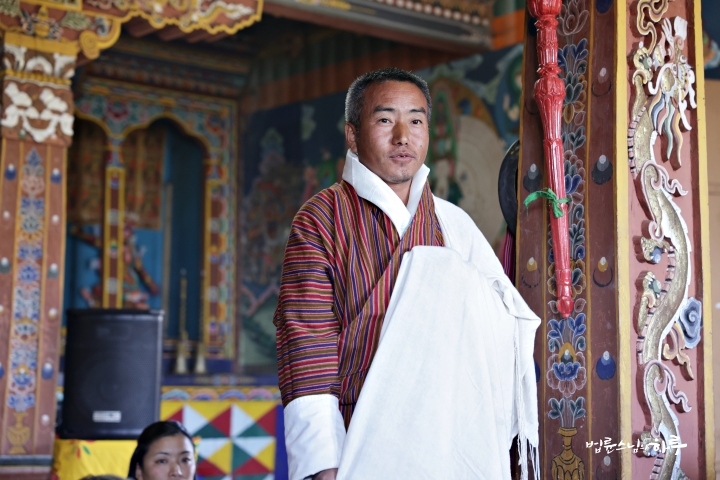
“Hello, I am the Tshogpa of Shuprang Chiwog. The population is 200, and out of 20 households, 2 have moved away, so there are 18 households. Although it’s much better than before, it’s still in poor condition.
While individuals may have many needs, the three things our village needs first are:
Firstly, some people don’t have houses, and some have unfinished houses. These people are in situations where even family or relatives can’t help them.
-Our village needs road repairs. There’s a big curve at the entrance of the village, which is built with red soil. It’s very dangerous during the rainy season. If we could just cover that part with cement, it would be much easier to use.
-Water shortage is also a fact, but I think we might need government help for this part.
-Lastly, the temple facilities. Currently, we’re building the temple toilet with government budget, but the kitchen is temporary. So when we have events like today, it’s really inconvenient. Thank you.”
There were several other opinions after this.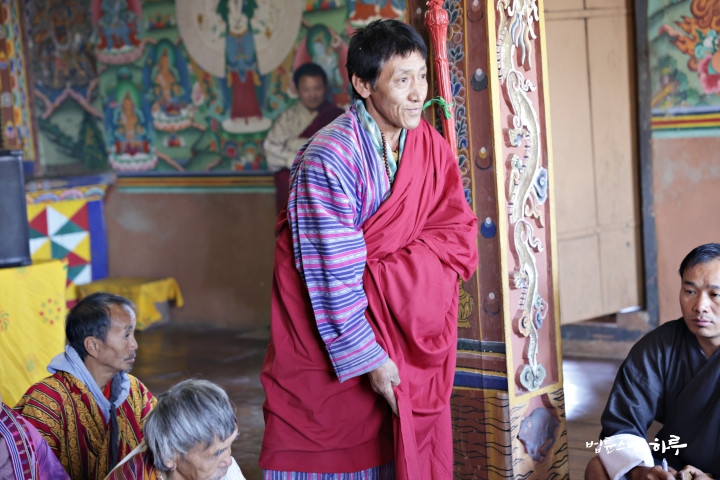
We want to receive support for cows that produce a lot of milk to try village communal livestock farming.
We want to irrigate the fields. We’d like to receive pipe support.
We don’t have houses.
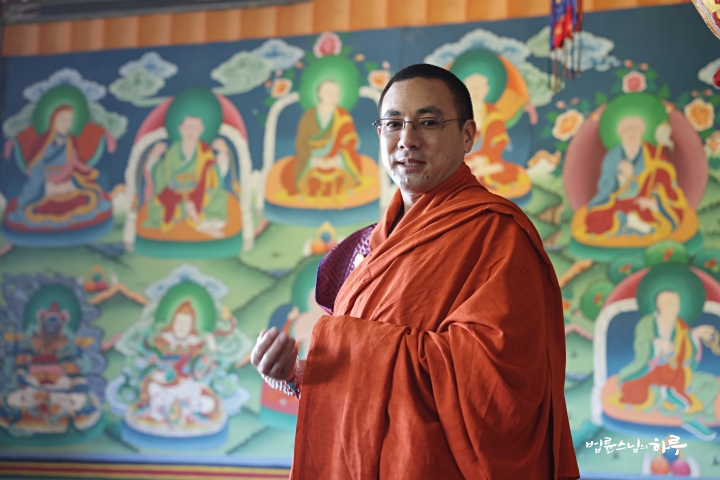
For the residents of Shuprang village, the temple seemed to be like a community center. There were three people who wanted to repair the temple facilities. After listening to the Tshogpa, villagers, and the head monk of Shuprang village for about 40 minutes, Sunim said:
“An important goal of this project is to improve individual living conditions or make production facilities more convenient. The goal is to improve the lives of poor people.
The goal is not to repair the temple.
Do you believe that if you build a temple or make offerings, you will receive blessings?”
“Yes, we believe we will receive blessings.”
“Then should you build the temple to receive blessings, or should I build it to receive blessings?” (Laughter)
“I came here to solve your difficulties, not to build a temple. If your lives improve, you’ll make offerings to the temple and the monks, right? That’s how you should receive blessings. Building the temple or making offerings to the head monk is your job.
I came here to help with the difficulties in your lives. So, making offerings to the head monk and building the temple is your responsibility.
Among the things I heard today, what I can support is for people who don’t have houses. People who need to build new houses or repair their houses. But I’m not going to build the houses for you.
You should build houses for people who anyone in the village would look at and say, ‘That person really needs a proper house, it’s a pity.’ In such cases, I will provide the materials for building the house.
But in this village, since there aren’t many people, you might only be able to build one house a year. You have to farm and do household chores, so you can’t just build houses all the time. So even if I provide the materials, you can’t build two or three houses. You need to plan only for the amount you can do in a year.
Secondly, from what the Tshogpa said, it seems cement support is needed for the curved road leading up to the village. Then you all need to come out and work on the road. If you cover the curved parts of the road or where water passes with cement, it will be convenient to use even if you don’t cover the entire road.
Thirdly, repairing houses is also possible. It’s possible to build a toilet if there isn’t one in the house, or to repair the kitchen.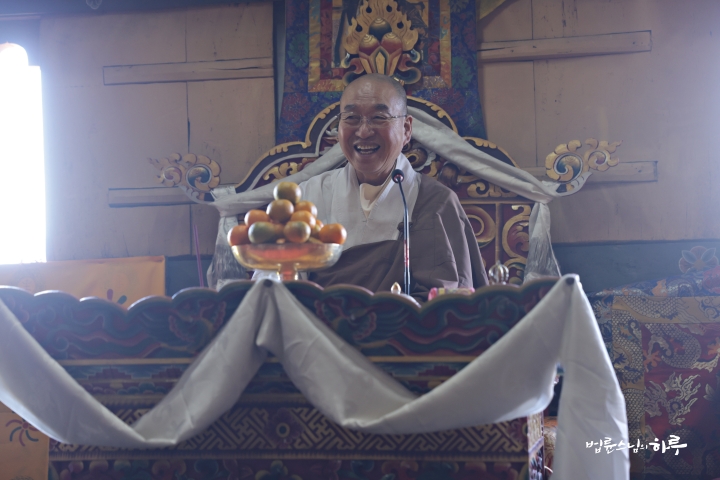
Fourth, it’s good to create irrigation channels to water our fields. However, if you use pipes instead of cement, it will be difficult to support. This is because cement is produced in Bhutan, but pipes need to be imported from abroad. While pipes are necessary for drinking water, irrigation channels can be made with cement. We try to support materials produced in Bhutan as much as possible.
Discuss these specific needs and plans with the Tshogpa.
We understand that the temple here is a public facility for the village. It’s true that it needs a bathroom and a kitchen. However, let’s prioritize things related to your living conditions, production facilities, schools, and water supply and sewage systems, and then we’ll repair the temple facilities.
Only then did the people unanimously say:
“That’s right. What Sunim says is absolutely correct.”
“Our living conditions should be improved first.”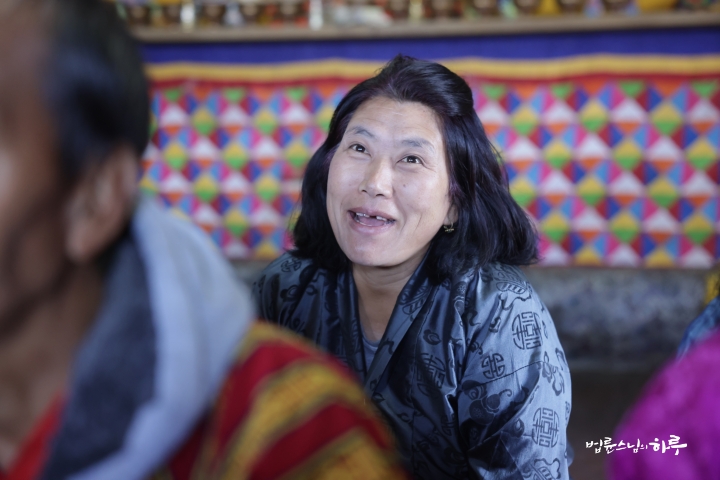
“We want to build houses, but the cost of obtaining wood is too high. If we could just get support for the wood, we could do everything else ourselves.”
“If you apply for house construction, we will support the cost of fuel for cutting wood.” 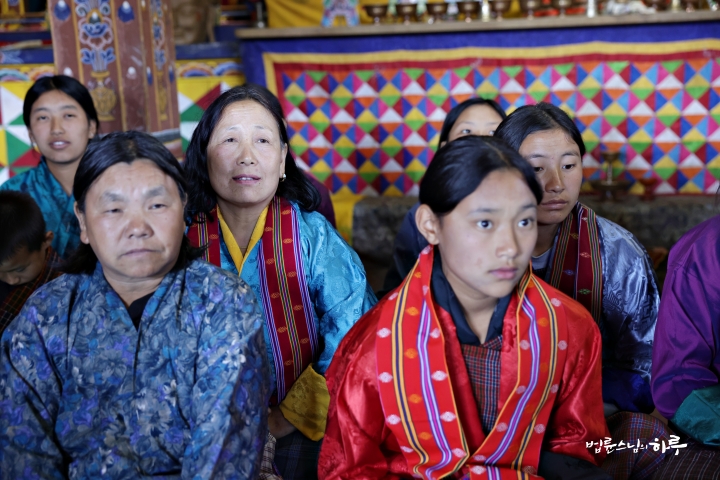
Sunim finished the conversation with the residents after about 1 hour and 10 minutes and made an offering to the Tshogpa, encouraging him to use it together with the villagers. He then also gave an offering to the temple’s chief monk.
Although Sunim is visiting three villages today, the schedule is tight due to long travel times. As he was leaving the temple, Sunim stopped an elderly woman who had been listening attentively in the front row all day and asked:
“Grandmother, can you see well?”
“I can’t see well.”
“How about your teeth? Try saying ‘ee’ once.” 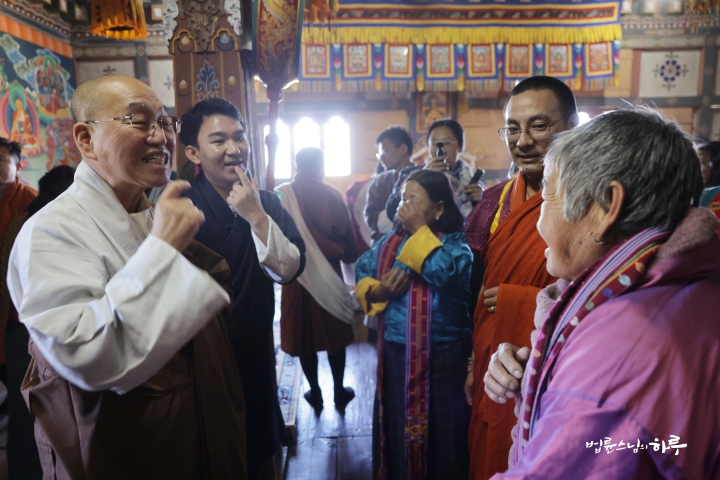
“Ee-“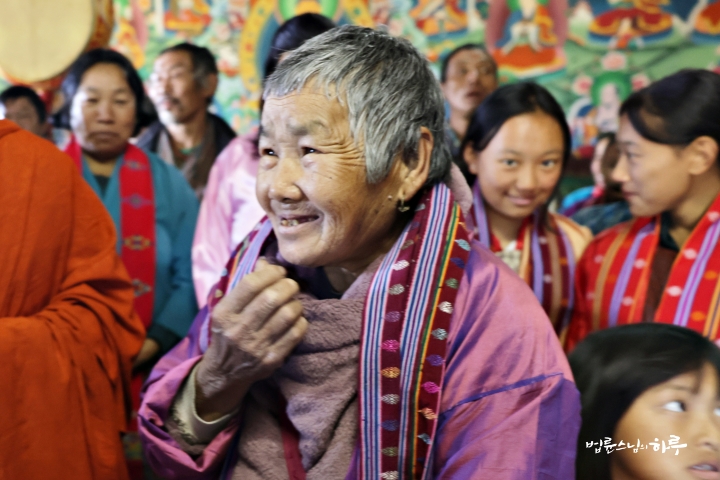
The grandmother had almost no teeth.
“Grandmother, you need dentures.”
Feeling shy, the grandmother closed her mouth tightly and smiled.
“We need to assess the health conditions of the elderly in each village.”
Sunim said to the volunteer.
The chief monk of Shuprang Temple came out to see Sunim off. As Sunim was hurriedly moving on, he said to the chief monk:
“You’ve done a lot of construction work for this village, Sunim. The stairs you built together with the villagers are clean and well-made.
Please also look after improving the housing for the poor people. It would be good if you could oversee the village situation, monitor the progress, and take care of things. If you do that, future construction projects will happen naturally.”
The chief monk of Shuprang stayed until the end to see off Sunim’s departing car.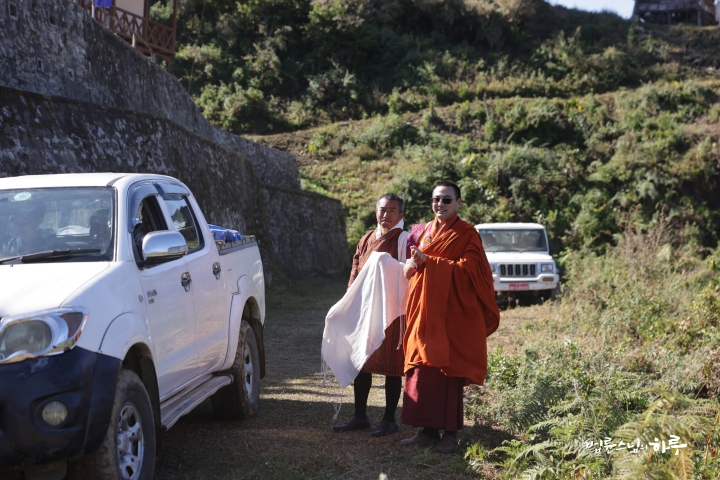
“Well, I’ll come back again next time.” 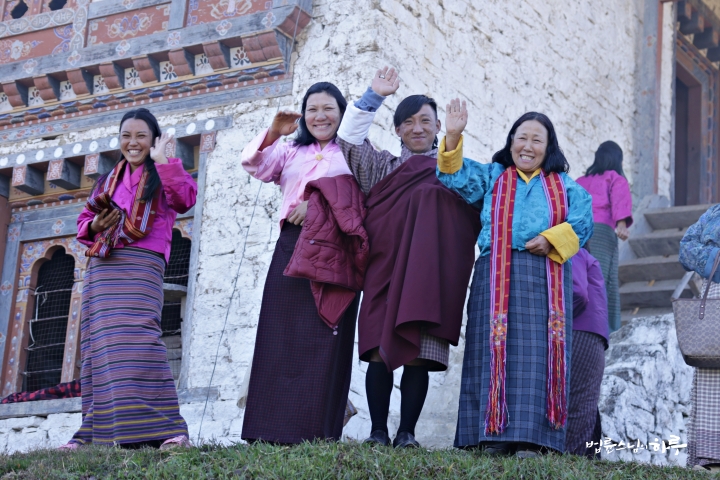
Sunim traveled by car for about an hour to reach Gompu village.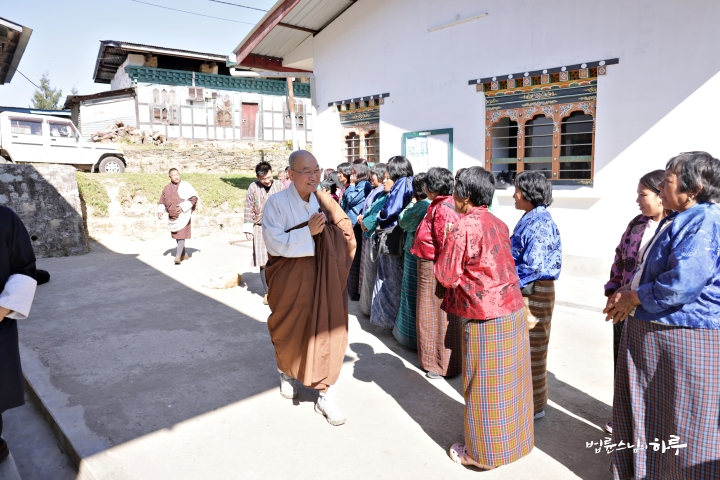
In Gompu village, about 70 villagers were waiting for Sunim in the school auditorium.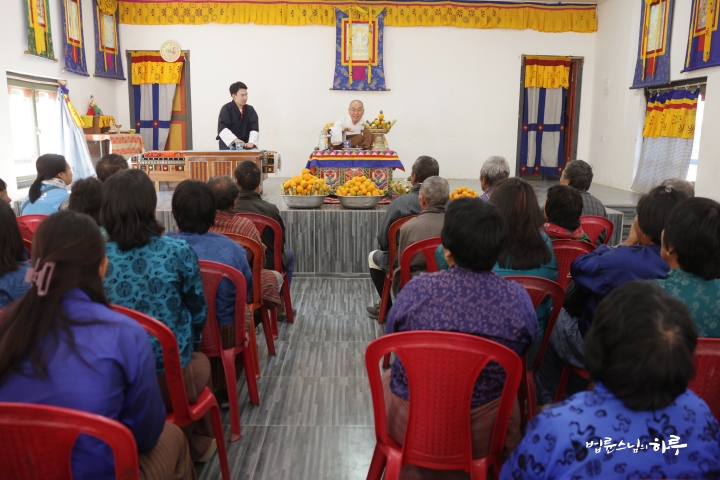
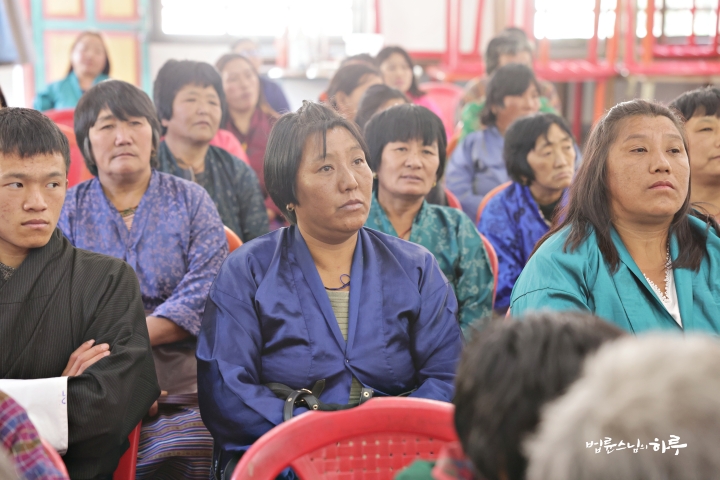
Sunim greeted the villagers and asked about their needs.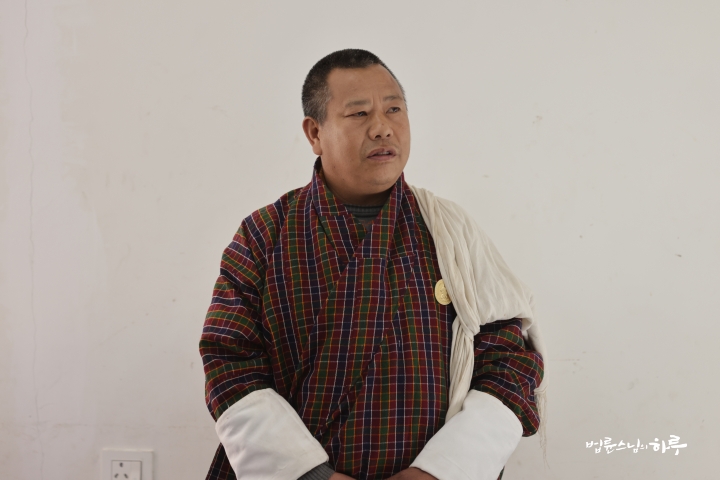
-There are two villages in Gompu Chiwog, one with 10 households and another with 7 households, and both lack drinking water.
-The school also lacks drinking water.
-The school fence is made of wood and needs constant replacement. We want to make it with iron.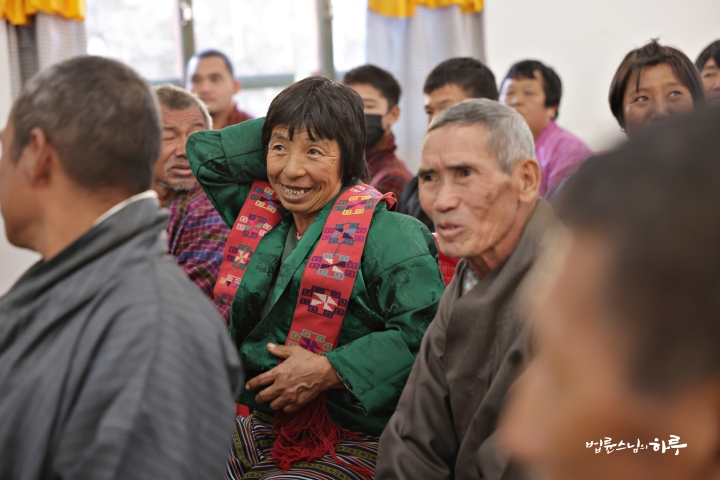
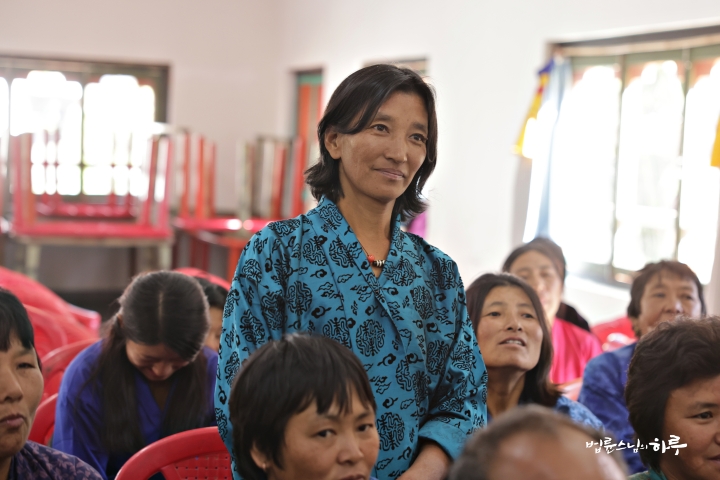
-The temple collapsed due to an earthquake and needs repair.
-We grow oranges in the village. The orange farm is quite large, but there’s no farm road, making farming very difficult. We need excavator work.
-It would be good to have partitions in the houses.
-There’s an elderly man in the village suffering from mental illness, and there’s no one to take care of him. It would be good if we could at least get support for food.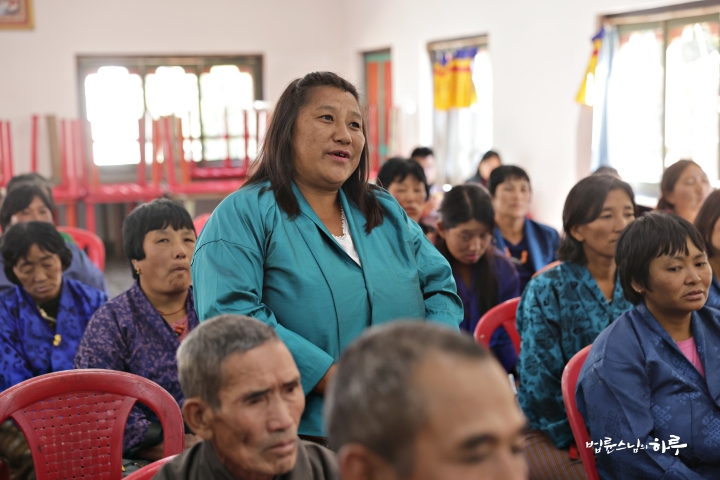
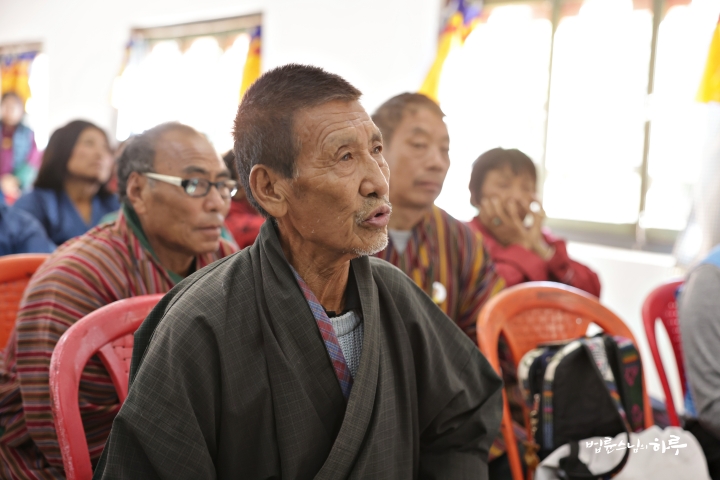
Various opinions were expressed. Sunim explained one by one which projects JTS could support and which it couldn’t.
“To solve the drinking water problem at the school, we need pipes. If we provide the pipes, can the parents or villagers carry out the construction?”
“Yes, we can do it!”
Only one elderly man answered.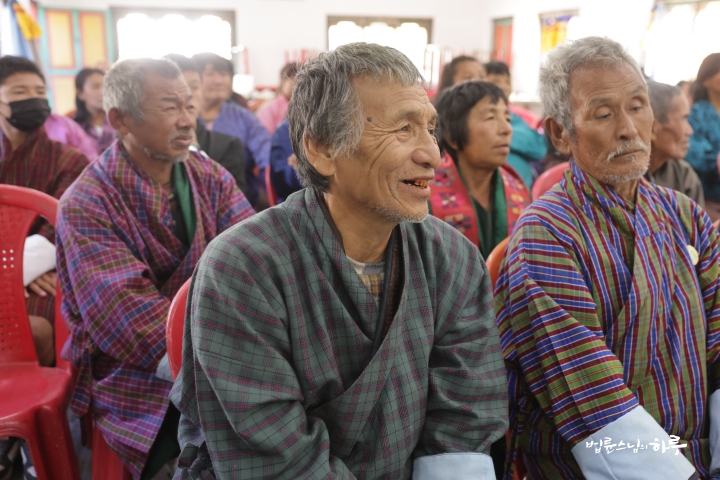
“No, how can you say that alone? Even if everyone here says they’ll do it, it’s not enough… (laughs)” 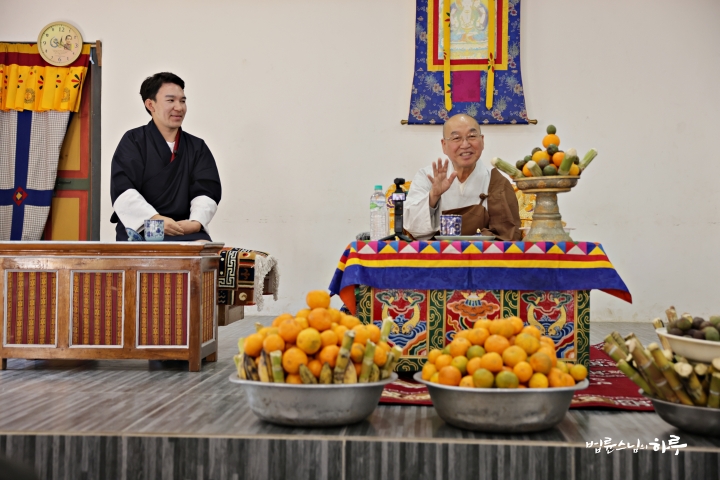
“Everyone who can do it, please raise your hand.”
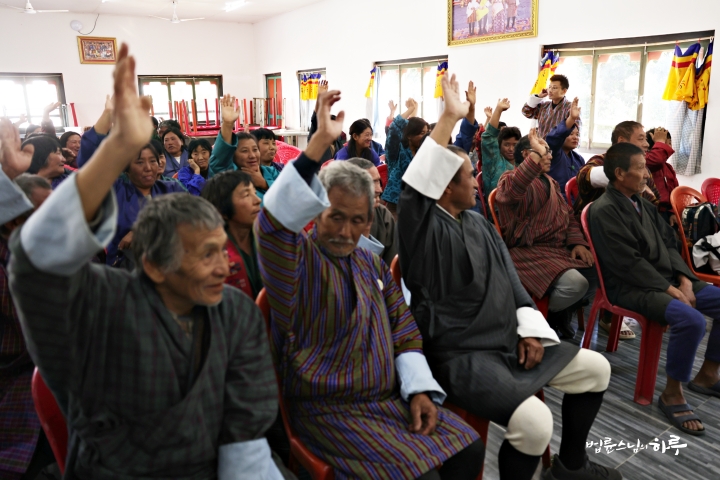
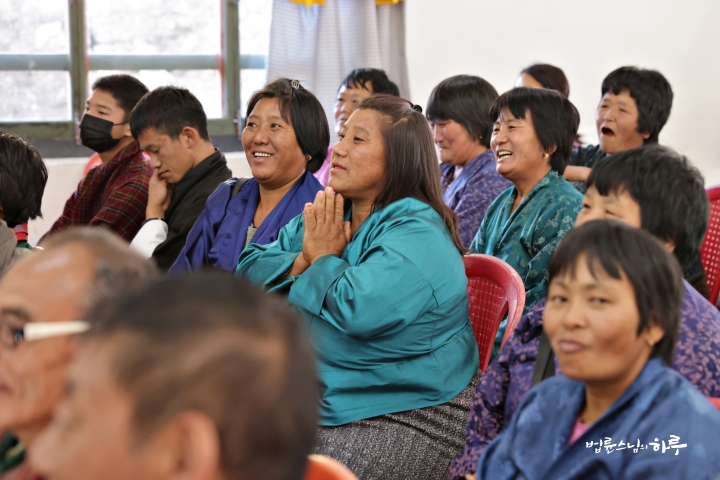
The villagers burst into laughter and raised their hands one after another.
“For the elderly man you mentioned last, there’s a foundation run by the King of Bhutan. It would be good to connect him there.”
It seemed that many villages were already familiar with JTS projects. The residents quickly understood and accepted Sunim’s words without needing a long explanation of the principles of sustainable development projects.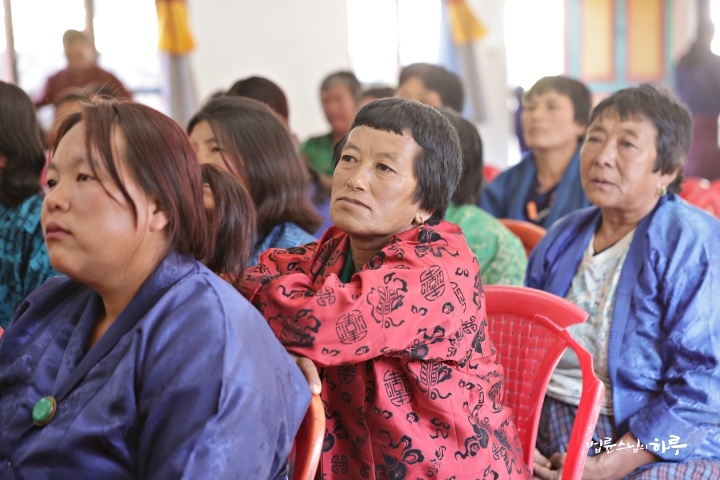
After discussing and organizing support projects with the Gompu villagers for about an hour, Sunim ate the lunch offering carefully prepared by the Gompu villagers and moved on to Phongcholling Trashigang.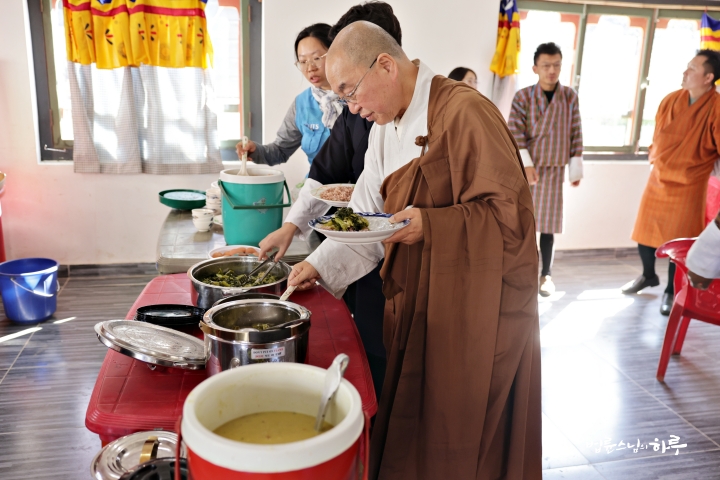
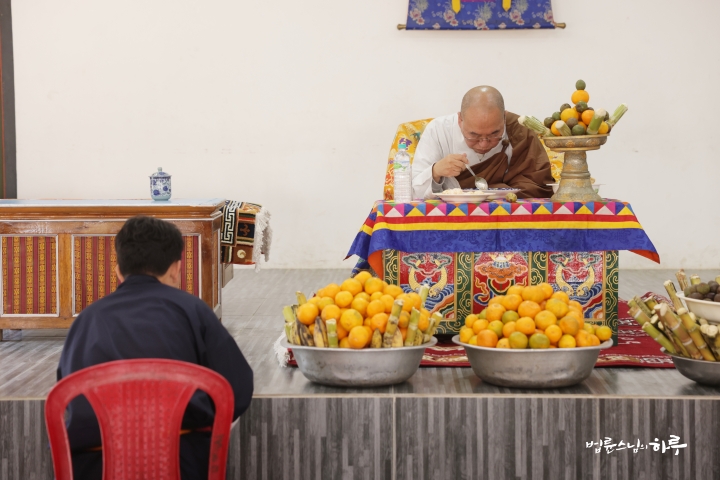
From the dining hall to the front of the car Sunim was riding in, the villagers lined up in a single file to seek blessings from Sunim.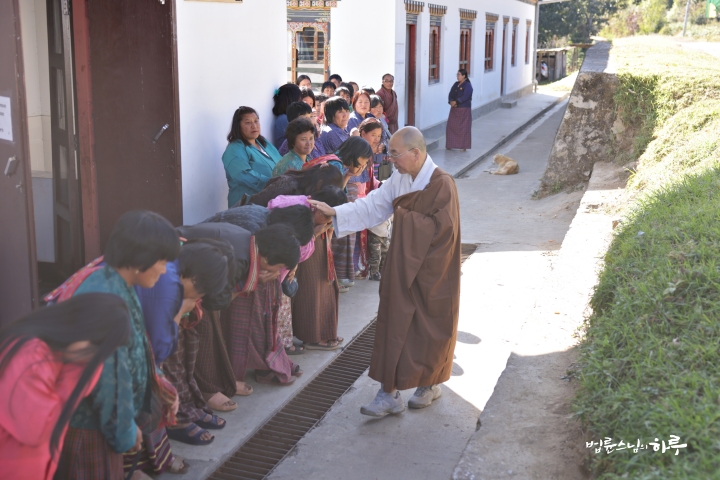
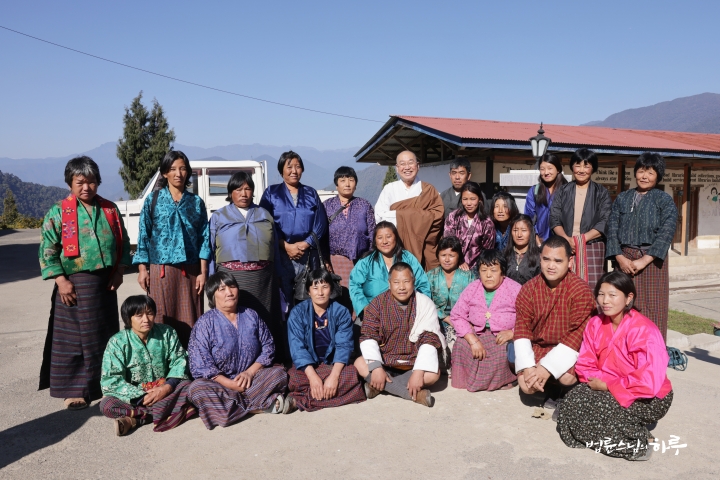
The village roads off the highway in Zhemgang, which Sunim’ve been surveying so far, were extremely rough. This time too, we traveled for about two hours on bumpy roads to reach Phongcholling.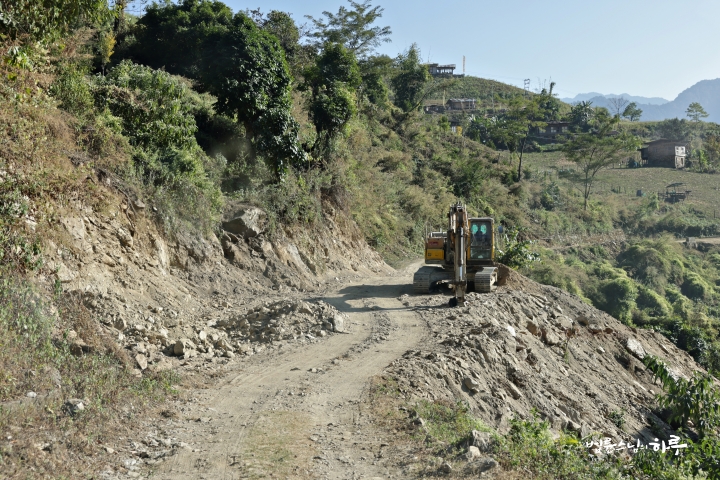
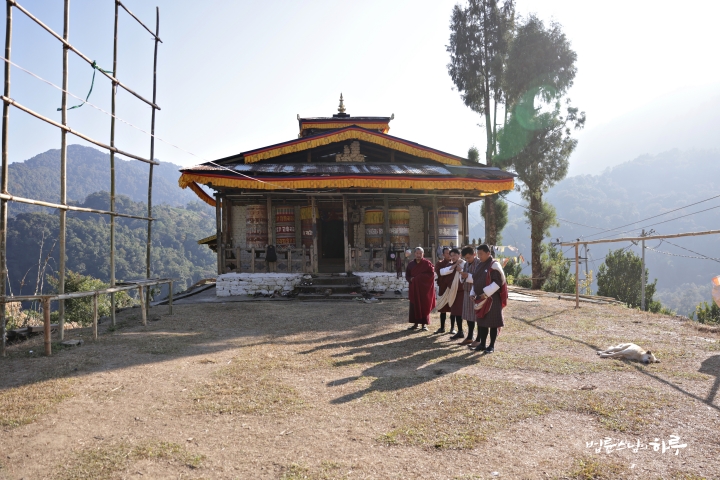
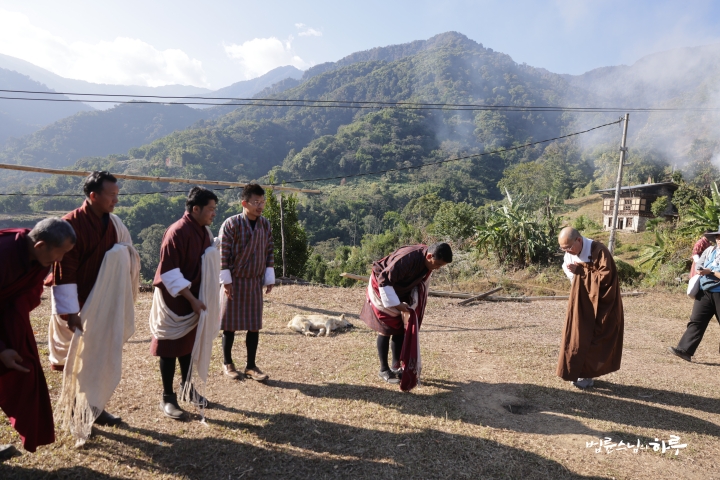
The temple was modest. Sunim paid his respects and sat down with the villagers.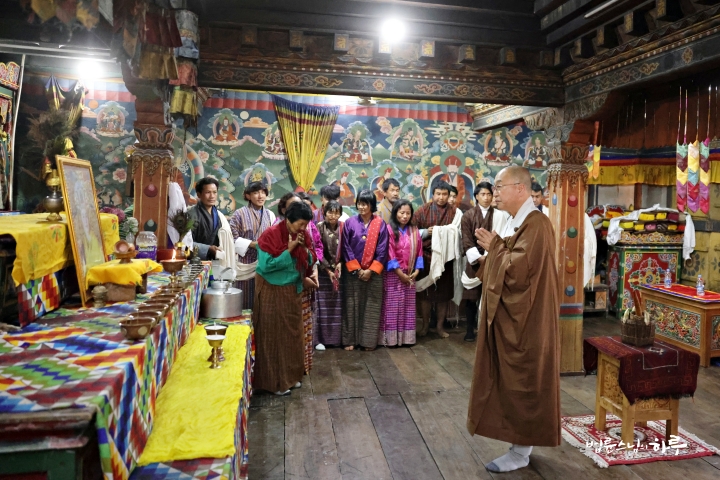
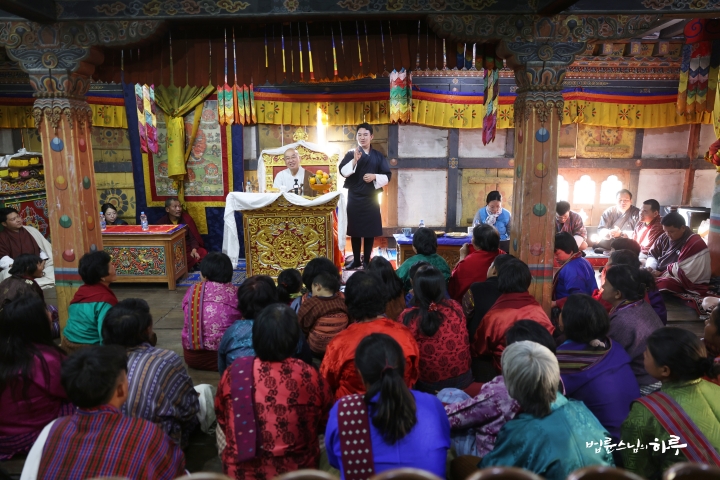
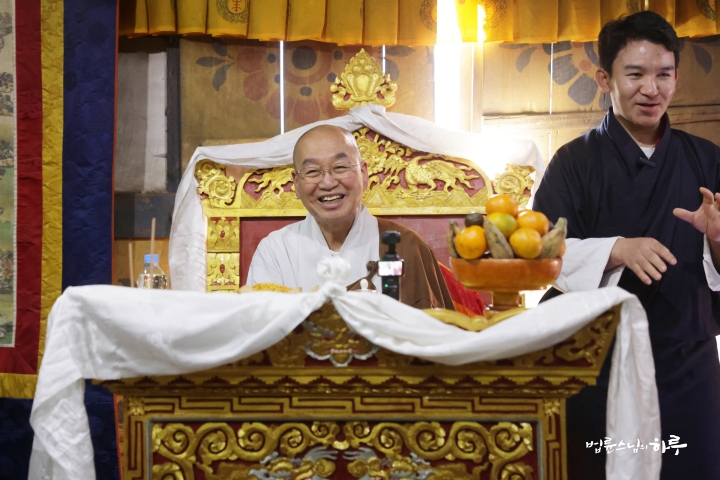
“Hello. I’m from Korea. I came to Bhutan last year at the invitation of His Majesty the King, and I want to help improve your living conditions. By improving your homes or villages, you can live a little more comfortably. Please tell me what you need for your daily lives.” 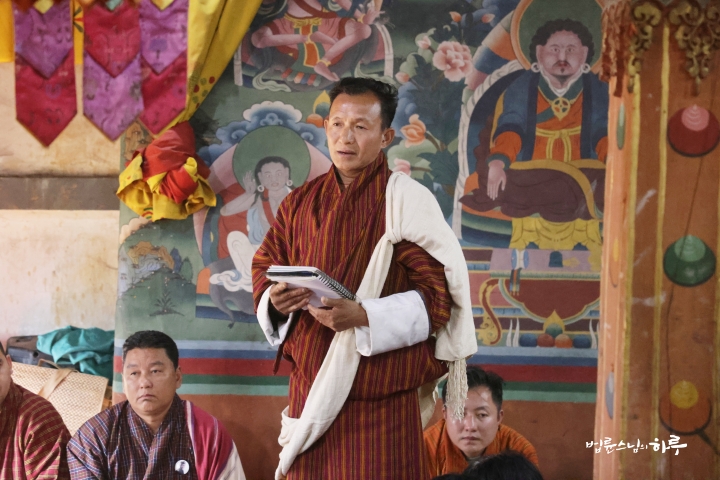
– Pongchula Chiyok has Gujong village and Pongchula village. Both villages need drinking water.
– There are people without homes.
– The village needs irrigation channels.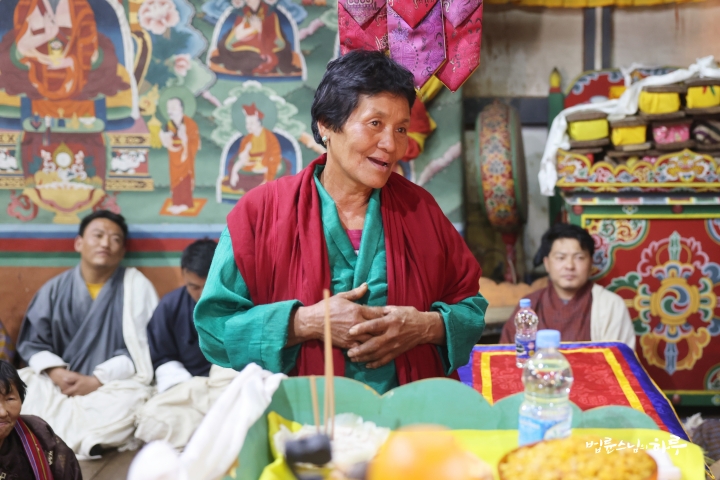
– I live at home with my daughter, and I have a grandson and a granddaughter. It would be nice to have partitions in the house.
– My older sister can’t hear or see. She doesn’t have a house.
– Wild animals damage crops. We need fences.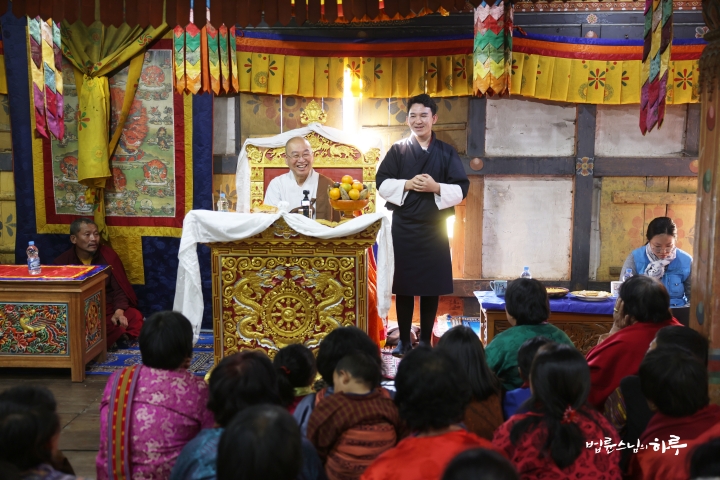
The requests from each village were not significantly different. Sunim checked and provided guidance on each request from the villagers.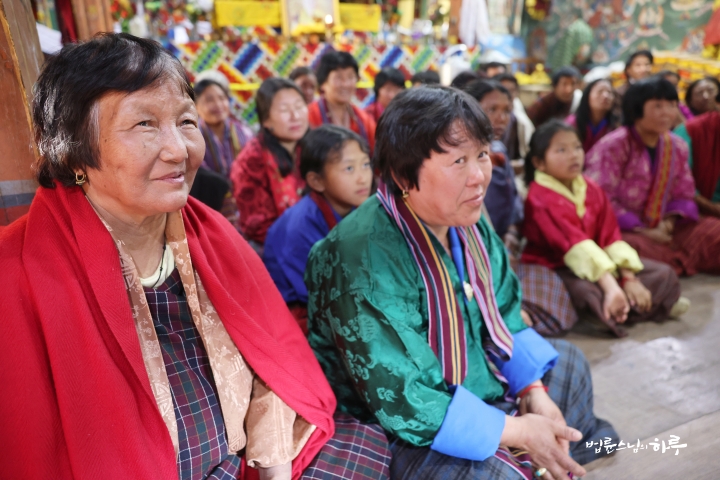
After talking with the residents of Pongchula village for about an hour, Sunim could see Gompu village, which we had passed through, far away in the distant mountains.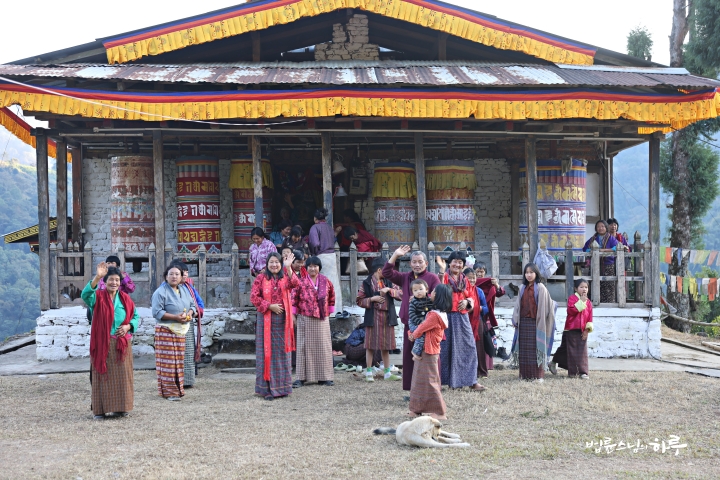
The sun is setting behind the mountains.
Tonight, all the Bhutanese volunteers were to gather at the Pantang JTS Center for dinner together. It’s not easy to adapt to the inconvenient life in Bhutan, leaving behind the comfortable lives in Korea and Canada. To encourage the Bhutanese volunteers who are working hard, Sunim decided to arrange a dinner gathering.
After briefly enjoying the view over the mountains, Sunim departed from Pongchula and headed to the Pantang JTS Center. He arrived at 6:30 PM.
“Did you all get some rest today?”
“Yes, we rested well.”
“Well, enjoy your meal and rest (laughs). Let’s all go on a field trip tomorrow.”
“Yes, that sounds good.”
The voices of the male lay practitioners were loud.
The sound of Sunim and the volunteers talking and laughing, along with the singing of the male lay practitioners, filled the Pantang JTS Center.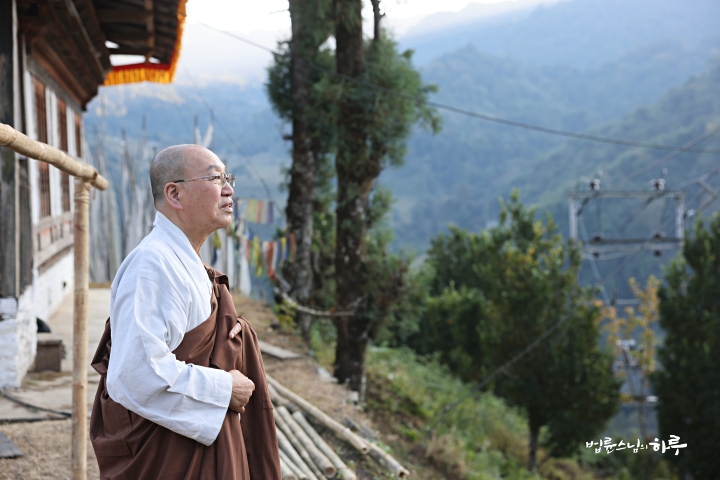
Since there was no Dharma talk today, I’ll introduce the content of the Dharma Q&A session held at the Jungto Social and Cultural Center on October 7th.
My fiancé took out a loan without telling me and failed at coin investment. Should I still marry him?
“Do you want to get married?”
“I think I endured all the difficulties while dating him because I wanted to get married.”
“Then marry that man. Because he’s good-looking and you like him. You can marry him, have a child, and then separate. That way, you’ll have experienced marriage, have a child, and there’s nothing to lose. Then you can marry another man who might be a bit lacking. You’ve always looked for a man who meets your standards without considering your age and conditions, but once you’ve been married and have a flaw, you won’t set such high standards for your partner. You might think, ‘As long as he has money, it doesn’t matter if he’s short,’ or ‘As long as he doesn’t gamble, it doesn’t matter if he’s short.’ Your standards will lower significantly, making it easier to find a new man. In my view, if you let this man go, it might be difficult for you to marry again. Because if you end up marrying someone else whose looks or conditions don’t meet your standards, you’ll use that as an excuse to divorce later. In fact, the most important thing in married life is personality.”
“That’s right.”
“But right now, you’re not looking at a person’s personality, you’re only looking at their face and height. Many people look at face and height, appearance first when getting married. The second thing they look at is education, wealth, and ability. They look at personality third, so most people end up only considering appearance and ability. However, when you live together, most conflicts arise from personality or lifestyle habits. The face only matters when you get married; it doesn’t cause any issues until you die. Because the mind works backwards like this, no matter how much advice people who have been married before give, those who want to get married don’t really understand. This principle can only be realized through trial and error and experiencing consequences, so telling young people about this doesn’t help at all.
At this point, it will take time to find someone new, so the easiest way is to contact the person you were going to marry, get married on the date you’ve already set, and have a child. Because you’re not planning to live with that person for a long time from the start, you won’t care much about whatever mistakes they make. If you get married thinking, ‘I’ll have one child and then end it,’ your expectations for your partner will be lower, so you won’t interfere much, which actually increases the chances of the marriage lasting longer. That’s why I asked if you want to get married. Don’t look elsewhere, just get married on the date you’ve set. In the past, it would have been a problem because once you got married, that was it, and you couldn’t marry again. But in these days when you can marry multiple times, why worry? You’re only looking at men without considering your own age and circumstances, but it will be difficult to find a man you want other than him.”
“Thank you, Sunim.”




